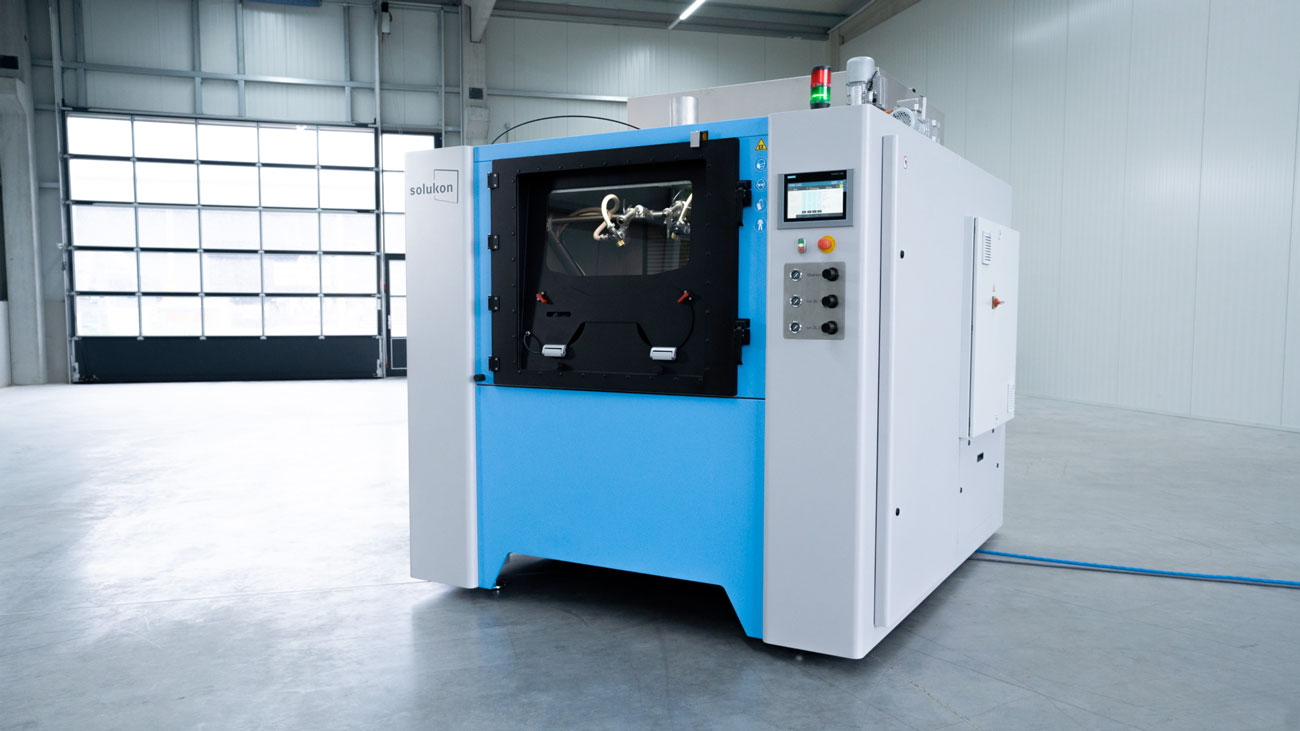With adapters for EOS P 1 and P 5 series SLS manufacturing systems, the Solukon SFP770 postprocessing system for polymer parts can now accommodate build boxes from other leading printers. These will enable Solukon to tap new markets in the area of polymer postprocessing. Furthermore, the SFP770’s unique unpacking device has been successfully patented.
Solukon introduced the SFP770 for the first time in the fall of 2020, presenting it as a postprocessing system for plastic parts manufactured by a P 7 series EOS printer. An automotive industry customer approached Solukon with a request to be able to both unpack and clean polymer components automatically, without the user coming into contact with the plastic powder. With consideration for every requirement—such as compact design and maximum flexibility—Solukon CEO and CTO Andreas Hartmann developed the perfect system in just a few months, the SFP770.
SFP770’s one-of-a-kind operating principle
Globally, the SFP770 is a one-of-a-kind postprocessing system. It is the only one to include both an automated unpacking station and a cleaning station for SLS components in just one system. The station is compatible with EOS P 7 series systems and encompasses the 3D printer’s entire build box. Thanks to the new adapters, the SFP770 can also integrate build boxes from P 1 and P 5 EOS printers.
The SFP770’s process
1. Loading
The build box is placed in the system by a lift truck.
2. Unpacking
A vibrating sieve cover is placed over the inserted build box, which then rotates gently overhead following an optional programmable process, gradually separating the components from the powder. The loose powder is extracted from the sieve cover directly and without contamination and conveyed to a recycling unit or storage silo.
3. Transferring
Once the unpacking process is complete, the build box rotates towards the basket and opens the sieve cover. The sieve cover now functions as a slide and the parts are slipped carefully into the basket. If necessary, the automatic transfer process can be paused to manually remove certain components that should not be cleaned automatically.
After transfer, the system can immediately be loaded with a new build box, while the components from the first batch are cleaned in the second half of the system, the basket.
4. Cleaning
The basket rotates in the direction of the blasting unit and begins turning. The glass bead blast and ionized air cleaning process is fully automated and removes residual powder. Process parameters, such as rotation angle, blast intensity, distance or basket rotation, can be easily programmed online by the user.
The new product video illustrates the system’s operating principle. It shows the handling of a P 7 build box.
Core advantages of the SFP770
With the SFP770, Solukon is paving the way to fully automated postprocessing and thus the industrialization of 3D printing.
Automation of both the unpacking process and the transfer to the cleaning process means that the operator has almost no contact with the powder. This combination of unpacking and cleaning in one system makes “dust-free AM production” possible. The automation and combination of two high-cost secondary processing steps also increases the acceptance and feasibility of industrial AM production.
Combining unpacking and cleaning in one system, the dust-free AM factory becomes viable.
The flexible programming of the postprocessing system is another great advantage.
“Because so many process parameters can be programmed, the SFP770 achieves the best cleaning results, independent of build material and without manual intermediate steps. Our system offers another advantage: parts of varying shapes and sizes can be cleaned simultaneously, which increases the flexibility and productivity of AM production,” says Andreas Hartmann, CEO and CTO of Solukon.
In addition to the cleaning process itself, Solukon’s SFP770 also optimizes the preparation of the blast material, i.e., the glass beads. While standard systems typically separate glass beads from plastic powder using air separators or cyclones, Solukon uses ultrasonic sieves. This produces incredibly clean glass beads, resulting in almost no losses.
Adapters for increased compatibility
Thanks to new adapters, the SFP770 can now also accommodate and clean parts manufactured with EOS P 1 or P 5 systems.
“We’ve received several requests for a postprocessing system, especially for the EOS P 500. Since the EOS P 500 is a standard plastic printer, our SFP770 postprocessing system paired with the correct adapter is now available to a much larger user base,” Andreas Hartmann is happy to report.
Patented technology
On a further positive note, the SFP770’s unpacking device is now protected by the European Patent EP 3 789 184 B1. This patent grant underscores the novelty of this operating principle and protects the system’s high level of innovation.
The future of polymer postprocessing
Following the successful introduction and nearly two-year implementation of the SFP770 in industrial manufacturing environments, Solukon sees itself well prepared for future integration of the SFP770 in fully automated manufacturing systems.
“We expect plastics manufacturing to trend strongly towards a focus on postprocessing, because it constitutes the decisive step in determining if something is truly manufactured in series or not. You can optimize a manufacturing process for serial production as much as you want, but if the subsequent postprocessing fails to meet the same high standards, you will not have true serial production. At Solukon, we therefore expect to see an increased demand for automated unpacking and cleaning stations. Thus, we are also ready to automate the loading and unloading steps. Discussions with international manufacturers and system suppliers are already in full swing. We are proud to be able to participate in the future of additive manufacturing in this area,” Andreas Hartmann says.
Find out more about Solukon at solukon.de.
Subscribe to our Newsletter
3DPresso is a weekly newsletter that links to the most exciting global stories from the 3D printing and additive manufacturing industry.


























